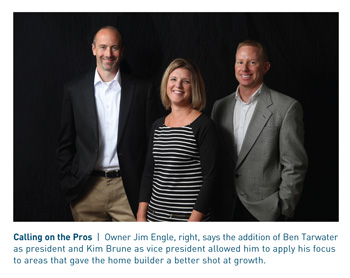James Engle Custom Homes
Anybody in Kansas City the night of Oct. 4, 1998, remembers the weather: 18 inches of rain that came down so hard they actually cleared the field when the Chiefs were playing the Seattle Seahawks.

Jim Engle remembers watching water cascading in waves from the upper deck at Arrowhead Stadium, but not because he had a big bet on the game.
“I’m watching this thinking ‘Oh, my God,’ I just dug this hole today” for the first house he was building, five years before James Engle Custom Homes even existed as a corporate entity. It was a potential disaster that could have killed his home-building dream in the cradle and returned him to life in accounting. “I remember going out the next day, and all the dirt was just caved in. But I didn’t have an option. I had started already—what are you going to do, push it back in and say I can’t do this?’ No—I have to finish it. There was no other option.”
And, after four months to reconstruct the site and get a foundation in, he did. The kernel of that will to overcome all obstacles has blossomed into a company that builds 150 homes a year, the vast majority of them sold to home-buyers before ground is ever broken. Engle’s persistence—twinned with the no-nonsense appreciation for numbers and conservative business principles—has paid off as competitors have been taken down by misguided speculative work.
Engle veered into homebuilding almost by chance. His undergraduate degree in accounting and an MBA in finance led him to a small firm in Kansas City, but after deciding that he didn’t want to sit for the CPA test, he headed into banking, working as a credit analyst. Along the way, he and his wife, Cindy, started rehabbing a home—and got an offer on it even before they were done.
“We went ahead and sold it,’ he said. “Made a good bit of money on it, so we ended up reproducing that probably three times, selling the houses we intended to live in.” Before long, he crossed paths with a developer who became a fan of the Engles’ work, and asked them to build a model. He went back to school to secure more construction management skills, and the company was formed in 2003.
The Engles built the business into a company putting up nearly a house a week before Cindy decided it was time to step away and start another concern—The Engle Family. As it turned out, the timing pushed the home-building enterprise into hyperdrive, because it forced Jim Engle to make a decision:
“Once we started making headway and I knew that the company was making money, it got to the point where I realized I can’t do all this myself,” he said. “I said ‘I’ve got to get somebody in here who knows what they’re doing. I know the finance side, the business side, but I need somebody who knows the building side better than I do.”
That led him to start searching for executives with proven track records, and to a stark realization: “I was scared to death because I didn’t want to spend the money to hire somebody, and the person I needed was going to be expensive. Am I going to hire someone, put $200,000 into him and find out it was a bad investment?” But that type of investment, he said, is no different than going out and buying multiple lots with nothing more than a hope that things would work out. “Investing in people is the same way,” Engle said. “I needed to find somebody that had more experience and was a lot brighter than I am.”
That somebody was Ben Tarwater, now the company’s president. Engle found additional firepower in Kim Brune, vice president for sales. Engle still brings the mindset of a detailed numbers-cruncher to the table—a skill set he encourages any small business owner to assemble.
The MBA, he says, is “a nice background to have in the construction industry—especially from a banker’s standpoint. It might have made it a little easier for us to grow because we had access to money.”
Being able to answer a banker’s specific questions about financial statements is more important than ever, he says, given the tighter lending environment that followed the real estate downturn of recent years. Regardless of the sector, though, “I would highly recommend some form of accounting background” for any business owner. “Even if you’re not going to practice accounting, at least get some education in it. If you can deliver to the banks financial statements, on time, that are clean, you’re much more likely to be successful; it’s easier to get the financing you want.”
Return to Ingram's November 2012